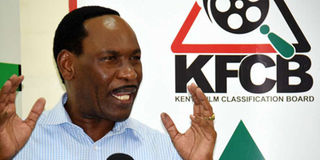Let us support art in its different forms, not crucify artists

Kenya Film Classification Board chief executive officer Ezekiel Mutua speaks during a media roundtable at the Technical University of Mombasa on January 25, 2018. He recently banned a film that endorses homosexuality.
What you need to know:
- Art has become a reference point that generates critical debate around human identity, modernity and politics.
- Creatives are susceptible to state suppression through draconian legislation because there are not enough laws to protect their rights.
In today’s world, bloggers, artists, designers, techies, hacktivists, writers, musicians, and citizen journalists all use modern tools of digital technology to speak truth to power.
This digital savvy group can be referred to as artists because they use their creative skills to generate content.
Increased mobile phone penetration and internet connectivity has boosted their ability to reach new markets.
They use their art to push boundaries and make bold statements on diverse issues.
As such, art has provided a means for the population, especially the younger generation, to express itself.
EXPRESSION
Through their creativity they challenge dominant views and perspectives.
These views go beyond governments to include religious and socio-cultural norms that are driven by powerful gatekeepers like cultural influencers and popular celebrities.
This use of artistic expression drives conversations and includes topics – like homosexuality – that were once muted in public discourse because they were considered taboo.
Art, therefore, has become a reference point that generates critical debate around human identity, modernity and politics.
FREEDOM
But the amplifying impact of the internet has meant that freedom of speech is coming under increased attack in East Africa, specifically in Kenya, Tanzania and Uganda.
These East African states are attempting to muzzle the voices of everyone in the expressive space. This is a means to stifle dissent.
Action taken against East African artists has been precipitated by the fact that they have moved beyond the everyday role of educating and entertaining to speaking out against political oppression and advocating change.
Some of their common areas of focus include governance, peace building, gender fluidity, emerging societal trends, environment and climate change, sexual reproductive rights, and gender-based violence.
REGULATION
In Kenya, for instance, musicians are often at the forefront of the movement for social justice. Singer and songwriter Eric Wainaina is one of many.
There have been concerted state efforts to control the vibrant East African creative industry.
This has been done through arbitrary arrests, harassment, intimidation, and even murder.
A number of other barriers also affect freedom of expression. One of them is cultural values.
Critical work by artists is not always well-received because part of the audience is deeply conservative — politically, culturally and spiritually.
The field of creative arts is poorly regulated. This has allowed East African governments to deal harshly with what they perceive as disruptive output.
FILM BANNED
Creatives are susceptible to state suppression through draconian legislation because there are not enough laws to protect their rights.
In Kenya, for example, the Kenya Film Classification Board has been seen to overstep its mandate, which is to regulate the creation, broadcasting, possession and distribution of film and broadcasting content.
Most recently it banned a Kenyan film because of its lesbian content.
Finally, some creatives confess that they have to grapple with self-censorship, both at an individual level and within their employment contexts.
CITIZEN JOURNALISM
One example is newsroom cartoonists who must constantly question if they have gone too far with their criticisms of the East African leadership.
These realities call for a robust conversation on the freedoms of speech and expression.
This must recognise the intricate relationship between traditional and non-traditional sources of information in a world where citizen journalism has become more prominent than ever before, and press freedom applies to anyone who creates content.
The writer is a lecturer at the School of Journalism and Mass Communication, University of Nairobi.




